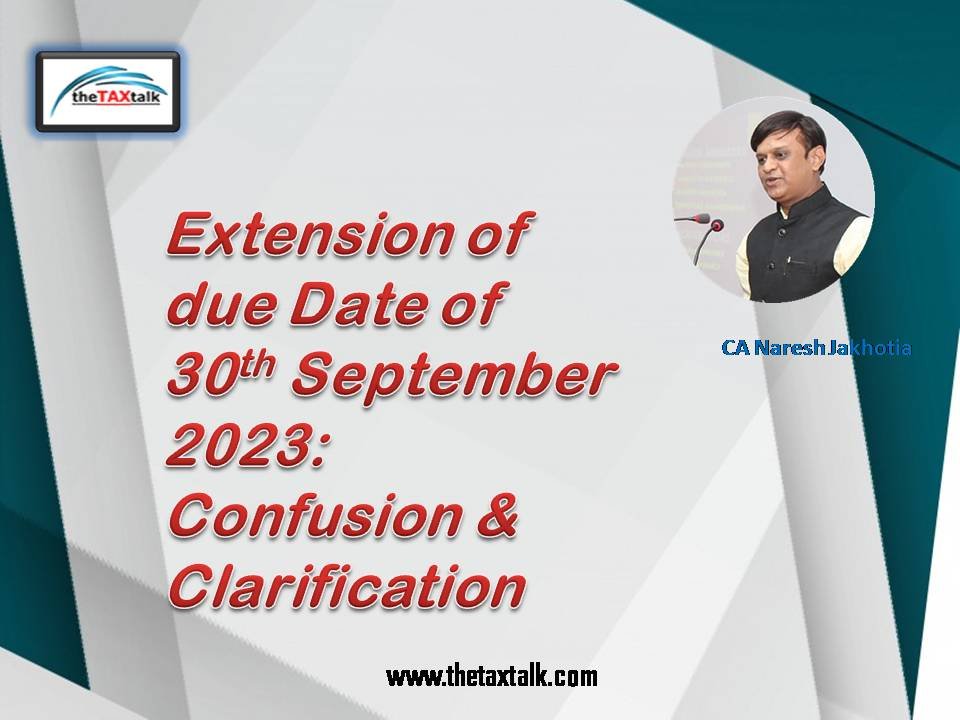![]()
Extension of due Date of 30th September 2023: Confusion & Clarification
Query 1]
It is seen that banks classify the interest data to two separate heads i.e., interest which is paid and that accrued. The question is, do we have to take both the figures for estimating the total interest received or only the interest paid data? The argument is that unless the interest is actually paid or credited to the account, it should not be taxable. After all the TDS is recovered only on the interest that is credited and not on the accrued interest. The amount that is accrued does not mean that it has been credited during the financial year under consideration. Is there a chance that it may get credited in the next financial year and be considered under interest paid head, for that year? Whether the tax can be deferred if the FDR is renewed as the interest will be received in subsequent years in this case?
Opinion:
- Your question is regarding the year of taxation of interest Bank FDR with maturity period spread over more than one financial year. Whether interest is taxable on receipt basis or accrual / due basis?
- Interest on the Bank FDR may be chargeable to tax either under the head “Income from Business or Profession” or “Income from Other Source”. For salaried and other taxpayers who are not in business, the interest income would obviously be taxable under the head “Income from Other Source”.
- Income Tax Act provides that any income liable for taxation under the head “Income from Business or Profession” or “Income from Other Source” shall be charged to tax in accordance with the method of accounting regularly employed by the taxpayers. As such, the taxpayers have an option to offer Interest income for taxation in the following mode:
(i) On accrual (due) basis i.e., year on year basis (it is known as mercantile system of accounting) or
(ii) at the time of maturity of the FDR only (it is known as cash system of accounting). - The option of choosing the method of accounting/recording the transaction in the books for taxation is freely available with the taxpayers. However, once taxpayers adopt any particular method, it should be consistently & regularly employed.
- Irrespective of the method of accounting followed by the depositor/investor, the liability to do TDS triggers in the hands of the bank (i.e., payer) at the time of payment or credit in its books of accounts, whichever is earlier. In short, the bank is duty bound to do the TDS on an accrual basis. Whether a depositor offers the interest on maturity on accrual basis, TDS will be done and reflected on accrual basis in Annual Tax Statement (i.e., Form No. 26AS) of the depositor.
- As far as renewal of bank FDR is concerned, it is normally presumed that the interest has been paid by the bank and the renewal tantamount to investment (or say reinvestment) of the interest amount back by the depositor. As such, the renewal of FDR may not be considered or may not help the depositor in deferring the taxation of interest income and the amount of interest will be taxable even if the taxpayer is opting for the cash system of accounting.
- In my personal opinion, following mercantile system of accounting would be easier & better as it will avoid the complications of reconciliation, TDS credit and would result in even distribution of income over different years. It may also result in avoidance of unwanted notices from the income tax department as TDS entries would be reflected in AIS/26AS on an accrual basis.
Query 2]
There appears to be confusion regarding the due date extension for companies by one month. There is news in some media that the due date for filing income tax returns for companies is extended by one month. However, there is no such news in the income tax portal. The only circular which is there says that the date is extended for charitable trusts. Please clarify. Also, please clarify the due dates of filing audit reports and other forms by charitable trusts.
Opinion:
- The due date of 30thSeptember & 31st October for the AY 2023-24 is not extended for all the categories of the taxpayers but is limited only for charitable trust, institutions, university, etc who are required to furnish audit reports in Form No. 10B / 10BB and Income Tax Return (ITR) in Form No. 7. The due date in such a case was September-23 for audit and October-23 for ITR filing. The same is now extended by one month to October-23 & November-23 respectively.
- Taxpayers may note that the due date is not at all extended for companies, societies & other categories of the taxpayers. The news published in some sectors of media is wrong and misleading.
- There are few queries which have been received by me regarding the non filing of accumulation statements in Form No. 10 by the charitable trust and the remedy for such failure in filing. Let me clarify it.
- a) Finance Act 2023 has prepone the date of furnishing statement of accumulation in Form 10 and deemed application in Form 9A to at least two months prior to the due date of furnishing of ITR. As a result, Form No. 9A & 10 was required to be furnished by the charitable trust on or before 31stAugust 2023.
b) To ease the burden of charitable trust, CBDT has issued Circular No. 6/2023 dated 24 March 2023 which provides that the charitable institutions shall not be denied exemption as long as the statement of accumulation/deemed application of income is furnished on or before the due date of furnishing return of income. In short, the benefit of accumulation shall not be denied if Form No. 9A & 10 for the AY 2023-24 is furnished till November-23.

